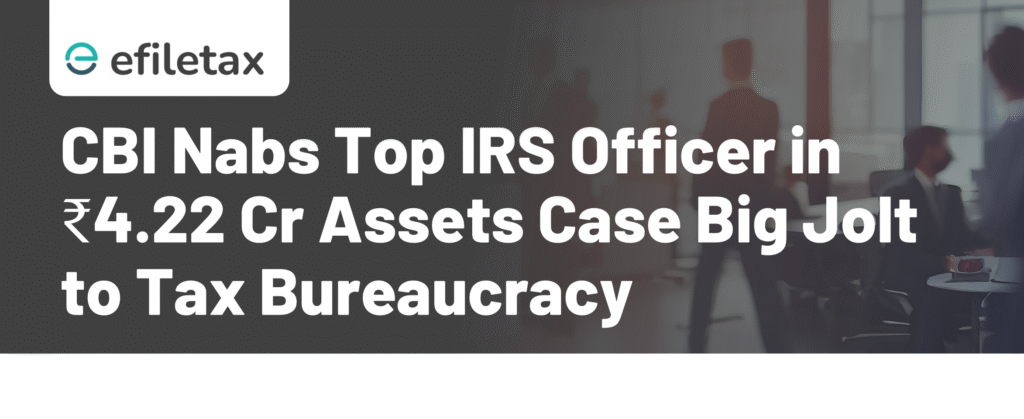
What Does the ₹4.22 Cr CBI Case Mean for Indian Taxpayers?
The recent disproportionate assets case involving a senior IRS officer booked by the CBI has stirred concerns across India’s tax and compliance ecosystem. The officer allegedly amassed ₹4.22 crore worth of unexplained assets—sparking debate on transparency within the income tax department itself.
Let’s break down what this means for taxpayers, and how it impacts the future of tax scrutiny and integrity in India.
What is a Disproportionate Assets Case?
A disproportionate assets (DA) case arises when a public servant possesses assets significantly beyond known income sources—often considered a violation under:
- Prevention of Corruption Act, 1988
- Section 13(1)(e) – for holding assets disproportionate to income
- Investigation usually led by the CBI after receiving credible inputs or complaints
Key Details: The CBI FIR
- Officer Involved: Senior Indian Revenue Service (IRS) officer
- Period Under Review: 2011–2023
- Assets Detected: Over ₹4.22 crore
- Declared Income: ₹3.05 crore
- Asset Disparity: Nearly ₹1.17 crore unexplained
- Properties: Flats and land in Telangana and Andhra Pradesh
- FIR Filed Under: Sections 13(2) r/w 13(1)(e) of PC Act, 1988
🛑 The accused also allegedly used the names of family members to acquire and hide assets—raising red flags on benami transactions.
Legal Takeaways for Taxpayers
Tax Compliance is a Two-Way Street
This disproportionate assets case underscores the growing call for transparency within tax authorities, not just by taxpayers.
Benami Law in Action
The case may invite scrutiny under:
- Prohibition of Benami Property Transactions Act, 1988
- Transactions in the name of spouse/family without legitimate income trails can be penalised.
Document Your Sources of Income
- Maintain asset registers
- Match major acquisitions with your declared income
- Keep bank statements, sale deeds, investment proofs
Expert Tip: Watch Out for Red Flags
“If your net worth grows faster than your reported income, expect scrutiny—whether you’re a taxpayer or an officer,”
says a former CBDT official.
Always ensure your Form 26AS, AIS, and property disclosures align with your ITR.
Broader Implications of the Case
| Aspect | Impact |
|---|---|
| Public Trust | Dent in credibility of tax institutions |
| IRS Oversight | Likely increase in internal audits of IRS officials |
| Policy Reforms | Push for stricter internal vigilance and asset declaration mandates |
| Taxpayer Response | Heightened caution in disclosures and filings |
How to Stay Safe & Compliant
- Declare all income, even exempt ones like gifts above limits
- Avoid proxy ownership—especially in land/property deals
- Don’t ignore AIS mismatches
- Keep digital records—scanned PAN-linked documents for big purchases
What Efiletax Can Help You With
- Detailed AIS/26AS reconciliation
- Benami compliance checks
- Property purchase tax due diligence
- High-value transaction audit support
FAQ: Disproportionate Assets Case
Q1. Can a taxpayer be booked for disproportionate assets?
No. DA cases apply only to public servants. But high-value undeclared assets can attract scrutiny under Income Tax Act and Benami Laws.
Q2. What’s the difference between DA and evasion?
DA refers to owning assets beyond known income (applies to govt officials). Evasion is illegal non-disclosure by any taxpayer.
Q3. Is a gift to spouse taxable?
Not taxed, but if spouse uses it to earn income, clubbing rules apply under Section 64.
Summary
The ₹4.22 crore disproportionate assets case against a senior IRS officer highlights growing scrutiny even within tax departments. Indian taxpayers must ensure clean disclosures, avoid benami deals, and align income with asset growth to stay compliant. Efiletax helps you stay ahead of such risks.